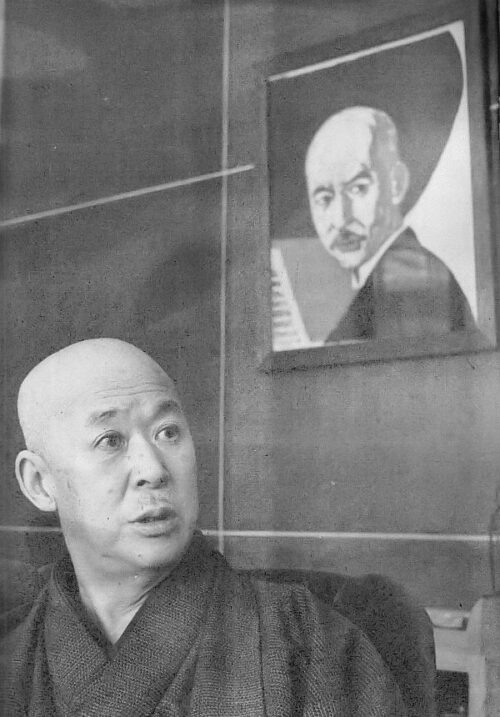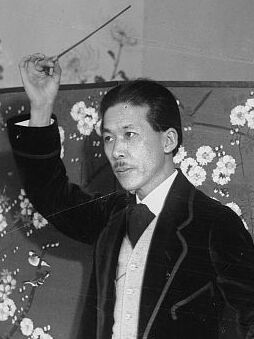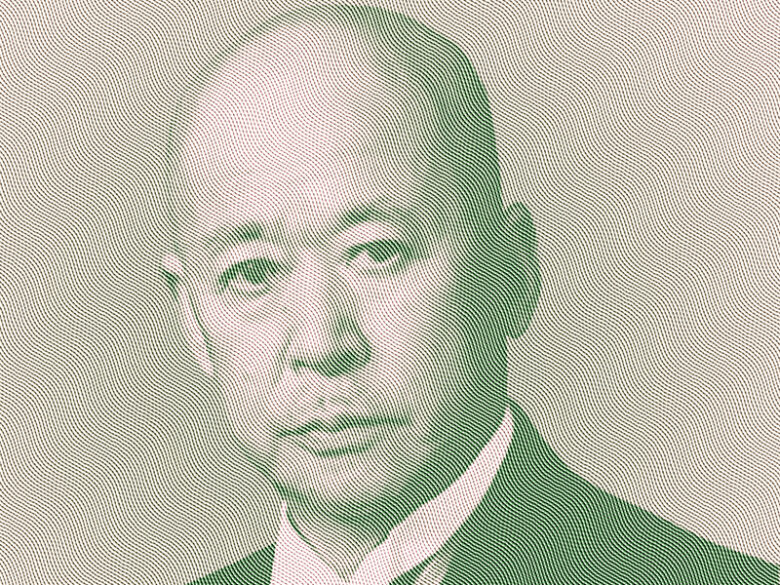
不明 – 毎日新聞社「毎日グラフ(1952年4月1日号)」より。, パブリック・ドメイン, リンクによる
YAMADA Kousaku (1886–1965) was a composer and conductor who left a significant mark on the history of modern Japanese music.
Life and Career
YAMADA Kousaku was born on June 9, 1886, in Tokyo. He lost his parents in his childhood and was raised by his sister and her British missionary husband. This environment is believed to have influenced his later musical activities.
In 1904, he entered the Tokyo Music School (now the Tokyo University of the Arts, Faculty of Music) and graduated from the Vocal Department in 1908. He then studied composition at the Berlin University of the Arts for four years from 1910, supported by the businessman Iwasaki Koyata.
After returning to Japan in 1915, YAMADA founded the Tokyo Philharmonic Orchestra, Japan’s first symphony orchestra, becoming a pioneer of the symphonic movement in Japan. He also established the Japan Opera Association in 1920 and the Japan Symphony Society in 1925, contributing significantly to the spread of Western music in Japan.
Works and Achievements
YAMADA’s works span a wide range of genres, including opera, orchestral music, songs, children’s songs, and film music. He particularly focused on composing songs and children’s songs that utilized the characteristics of the Japanese language, leaving many famous pieces.
Some of his representative works include:
“Karatachi no Hana” (Lyrics by KITAHARA Hakushuu)
“Kono Michi” (Lyrics by KITAHARA Hakushuu)
“Machiboke” (Lyrics by KITAHARA Hakushuu)
“Aka tombo” (Lyrics by MIKI Rofuu)
“Sunayama” (Lyrics by KITAHARA Hakushuu)
“Pechka” (Lyrics by KITAHARA Hakushuu)
These works are designed to be sung beautifully and naturally, making use of the accents of the Japanese language.
Additionally, YAMADA composed large-scale works using Western musical techniques, such as Japan’s first symphony “Kachidoki to Heiwa” (Victory and Peace).
Music Education and Literary Activities
YAMADA was not only a composer and conductor but also a dedicated music educator, leaving numerous writings. He greatly influenced Japanese music education from the Taisho to the early Showa periods.
Interestingly, he also wrote a book on astrology called “The Mystery of Birth Months,” published in 1925. This book, which describes personalities and fortunes based on birth months in an easy-to-understand manner, is still read today.

– この画像はアメリカ合衆国議会図書館の印刷物・写真部門から入手できます。デジタル識別子は ggbain.27699 です。このタグは、添付された著作物の著作権状況を示すものではありません。通常の著作権タグも必要です。Commons:ライセンシングもご覧ください。, パブリック・ドメイン, リンクによる
International Activities and Recognition
YAMADA was active internationally as well as domestically. During his year-and-a-half stay in the United States starting in 1916, he performed his orchestral works at Carnegie Hall, making his mark on the international stage.
His achievements were highly regarded both at home and abroad. In 1936, he received the Legion of Honour from the French government, and in 1937, he was awarded the Merit Award by the Japanese-German Cultural Association. He also received the Asahi Culture Prize in 1941 and the NHK Broadcasting Culture Award in 1950, and was recognized as a Person of Cultural Merit.
Wartime Activities and Evaluation
During the war, YAMADA composed many works in line with national policy. After the outbreak of the Sino-Japanese War in 1937, he composed pieces such as the “Patriotic March” and “Song of the Greater East Asia War,” aimed at boosting morale. In 1940, he composed the “Song of Nation Building” to celebrate the 2600th anniversary of Japan’s founding, actively participating in national events.
These activities have been criticized postwar, and YAMADA’s wartime responsibility is still questioned.
However, there are various perspectives on YAMADA’s wartime activities. Some argue that he could not entirely avoid the demands of the times, while others point out that he continued to create purely artistic works even during the war.
Thus, YAMADA Kousaku’s wartime activities and their evaluation are still subjects of ongoing debate, and his contributions as a musician are assessed in a complex manner.
Later Years and Legacy
In his later years, YAMADA suffered a stroke that left him paralyzed on the left side, but he continued his conducting activities. He passed away on December 29, 1965, at the age of 79 in Tokyo.
YAMADA’s works and achievements continue to have a significant impact on the Japanese music world. His compositions for children’s songs and songs are still widely loved and are included in school education.
In 2001, Iwanami Shoten published the “Collected Works of YAMADA Kousaku” in three volumes, providing a comprehensive view of his thoughts and activities.
YAMADA Kousaku, who pursued a unique musical expression that incorporated Western techniques while utilizing the characteristics of the Japanese language, laid the foundation for modern Japanese music. His influence continues to be deeply felt in contemporary Japanese music.
Although YAMADA left behind a vast body of work in Japanese music, no memorial has yet been built, perhaps because of the aforementioned question of war responsibility.
▼Cemetery of YAMADA Kosaku



コメント